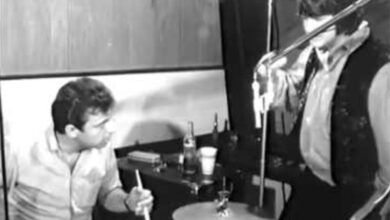I heard this song made my father emotional; after all, he was a Green Beret
In 1966, Staff Sergeant Barry Sadler released “The Ballad of the Green Berets,” a patriotic anthem that quickly became a hit, resonating with the national sentiment during the Vietnam War. The song honors the courage and commitment of the U.S. Army Special Forces, commonly known as the Green Berets. Composed while Sadler was recuperating from a leg injury he sustained in Vietnam, the track swiftly rose to No. 1 on the Billboard Hot 100 chart, maintaining that position for five weeks. It stood alongside other major hits of the year from iconic bands like the Beatles and the Rolling Stones.
Barry Sadler served as a medic with the Green Berets in Vietnam, and his military experiences deeply shaped the lyrics of his renowned ballad. The song’s immense popularity led to Sadler’s discharge from active duty and launched his career in the music industry. Despite this early success, his subsequent songs did not reach the same heights. The fame garnered from “The Ballad of the Green Berets” afforded Sadler appearances on well-known programs such as The Ed Sullivan Show. However, his later endeavors in acting, business, and writing did not achieve significant success.
Sadler ventured into literature in the late 1970s, authoring a series of pulp fiction novels centered on Casca Rufio Longinus, a Roman soldier cursed to live until the Second Coming. Although these novels did not receive critical praise, they garnered a loyal fan base and established Sadler’s status as an author. The series persisted even after Sadler’s passing, with other writers contributing to the storyline.
Tragically, Sadler’s life took a grim turn in the late 1970s. In 1978, he was involved in the deadly shooting of Lee Emerson Bellamy, a country music songwriter. Sadler was convicted of voluntary manslaughter and received a reduced sentence. Following this incident, he relocated to Guatemala in the 1980s, where he continued writing and is reported to have provided medical assistance to locals amidst the country’s ongoing civil conflict.
Sadler’s time in Guatemala came to a sudden end when he was shot in the head during what is believed to have been a robbery in 1988. He was airlifted back to the United States, where he remained in a coma and eventually became a quadriplegic. Barry Sadler passed away in 1989 due to complications from his injuries. “The Ballad of the Green Berets” endures as an important cultural symbol from the Vietnam War period, embodying both the era’s patriotic fervor and the intricate legacy of its creator. Despite his turbulent life, Barry Sadler’s impact on music and literature, especially through his depiction of the Green Berets, continues to be remembered and valued.





